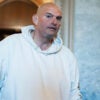“Congress shall make no law abridging the freedom of speech.” The words of the First Amendment couldn’t be plainer. Yet more than two centuries after the Bill of Rights was written, they remain the subject of fierce debate.
Actually, I should amend that (no pun intended). These words would be the subject of debate—if debate were permitted. But these days, apparently, we’re all so thin-skinned that we can’t bear to hear an opinion that challenges our worldview.
This is even true, ironically, at our institutions of higher learning. Some colleges are far more interested in swaddling their students in a protective bubble than in teaching free speech.
Consider what happened to Omar Mahmood. The University of Michigan student last year wrote a satirical piece for the campus newspaper, The Michigan Daily, listing the ways that the pervading culture of right-handedness victimizes left-handed people.
“The biggest obstacle to equality today is our barbaric attitude toward people of left-handydnyss [sic],” he wrote. “It’s a tragedy that I, a member of the left-handed community, had little to no idea of the atrocious persecution that we are dealt every day by institutions that are deeply embedded in society.”
Anyone familiar with the political correctness that pervades so much of society will recognize what Mahmood was lampooning. The victim mentality is particularly acute on many campuses, with professors nursing and even inflaming cultural conflicts on every level, leaving everyone walking around on eggshells.
In such an environment, Mahmood’s column could have served a valuable purpose. An actual debate—imagine!—could have ensued.
But no. The Daily’s editors couldn’t risk damaging the precious little psyches of his fellow students with anything as retrograde as a dissenting point of view. Mahmood had created a “hostile environment” for those hothouse flowers, he was told. Why, an unidentified staffer “felt threatened” by his column. Somebody pass the smelling salts.
Mahmood’s apartment was vandalized. He was fired from the Daily, of course.
Unfortunately, this isn’t an isolated incident. Hardly a week goes by without news about one campus or another preventing unpopular views from being expressed. According to the Foundation for Individual Rights in Education (FIRE), which tracks such violations, most U.S. colleges are guilty.
“This isn’t just an American problem,” Jim DeMint, president of The Heritage Foundation, noted in a lecture at Yale University. “Academia spans nations, and its diseases can swim across oceans.” Thus, for example, Oxford University canceled a pro-con debate about abortion “because, apparently, men aren’t allowed to have opinions on such things anymore.” Even the pro-abortion debater found that ridiculous.
More and more, this is our world. We don’t debate, we demonize. The New York Times Magazine documented this trend in a chilling article titled “How One Stupid Tweet Blew Up Justine Sacco’s Life.” It showed how Sacco and others have lost jobs, endured vicious threats and been forced into hiding for daring to make ill-conceived jokes or off-the-cuff remarks that others found offensive.
Part of the problem, surely, is rooted in basic ignorance of American history and our founding documents. That’s why I opened by quoting the First Amendment. It may strike some readers as too basic to even mention, but numerous surveys show an alarming degree of ignorance and illiteracy.
Heck, you don’t even need a survey. Jimmy Kimmel and other late-night comics often mine this ignorance for laughs with their man-on-the-street interviews.
But there’s nothing funny about the underlying cause. Or with its effect: a society where political correctness makes debate impossible and only those who express the “accepted” opinion are permitted to speak.
“You don’t communicate with anyone purely on the rational facts or ethics of an issue,” wrote Saul Alinsky in “Rules for Radicals,” the bible of the so-called progressive left. “Pick a target, freeze it, personalize it, and popularize it.”
Personally, I’ll stick with the First Amendment.
Originally published in The Washington Times































